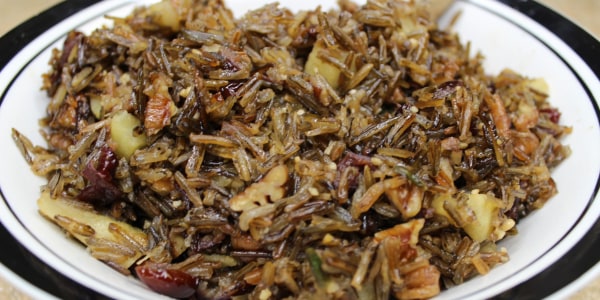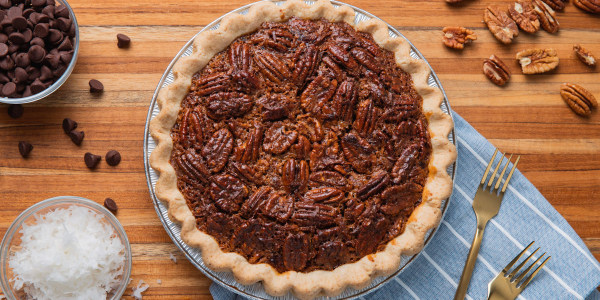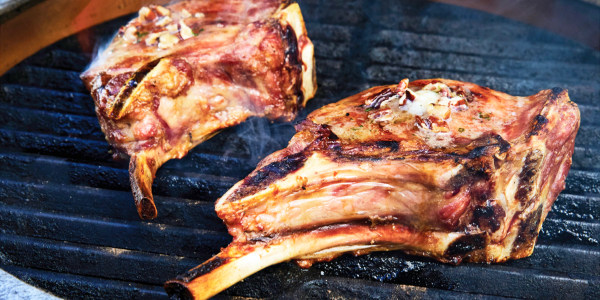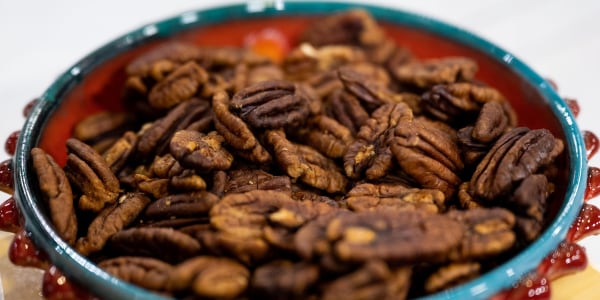Although pecans may not be the first nut you reach for at the store, their nutrition profile and soft buttery texture make them incredibly enticing. They are loaded with nutrients like antioxidants, fiber, protein, unsaturated fat, phytonutrients (plant compounds) and minerals, so there’s plenty of research linking eating nuts to heart health and weight management. And though you’ve probably added pecans to pies or praline, they have many more uses, like a topper for salads or casseroles or a nutty addition to pilafs.
Learn about the benefits of pecans, fun facts about the nut and interesting ways to use them in everyday cooking.
Pecan nutrition facts
One ounce (about 19 halves) of unsalted pecans have:
- 196 calories
- 3 grams protein
- 20 grams fat
- 4 grams carbohydrates
- 3 grams fiber (11% daily value (DV))
- 1.3 milligrams zinc (10% DV)
- 0.3 milligrams copper (35% DV)
- 1.3 milligrams manganese (60% DV)
The health benefits of pecans
Along with other nuts, pecans are known for their “good” unsaturated fat content. Even though pecans taste buttery, they don’t contain more fat than any other nuts. As a matter of fact, they contain the most fiber per serving of any tree nut. Those nutrients, combined with the antioxidants, phytonutrients and minerals, make pecans a winner in the heart disease and weight management category.
One of the first pecan studies on heart health compared 19 men and women with normal blood cholesterol levels who ate ¾ cup of pecans per day or avoided nuts for eight weeks. The participants who consumed pecans experienced a 10% reduction in LDL (bad) cholesterol after 4 weeks and a 6% reduction after 8 weeks. The study authors attribute this change to the unsaturated fat in the nuts.
A more recent study found that a handful of pecans each day (about 1.5 ounces) may improve certain markers of cardiovascular and metabolic diseases, like type 2 diabetes. The researchers gave 25 overweight and obese adults a pecan-rich diet for 4 weeks and observed positive changes in serum insulin, insulin resistance and pancreatic beta cell (which play a critical role in blood-sugar management) function. The pecan group also displayed reductions in markers related to cardiovascular disease.
Lastly, a recent animal study found that regular intake of pecans is associated with reduced levels of obesity and other related diseases, such as fatty liver or diabetes. The study gave mice a variety of different diets and concluded that the high-fat diet with pecans reduced fat mass, serum cholesterol and insulin by over 40%. What’s more, the gut microbiome diversity was richer in the animals that ate more pecans. Animal studies don’t always translate to human results, but the research is promising.
More nutritional information on everyday foods
Are there drawbacks to eating pecans?
Pecans are a healthy part of a well-balanced diet. That said, they are slightly higher in calories than some other nuts. For example, one ounce of almonds, pistachios or cashews has 160 calories, as compared to 200 calories in one ounce of pecans. Still, the 40-calorie difference is rather negligible in the grand scheme of your daily calorie allotment. But to avoid overdoing it on calories from pecans, limit your daily serving to one ounce.
Fun facts about pecans
These distinctive factors are a few more reasons to add pecans to your diet.
You can make your own pecan butter
Pecan butter is rich and subtly sweet, and you can easily make it at home. All you need are some pecans and a food processor or high-speed blender, as well as any other add-ins you like, such as salt, cinnamon or a touch of maple syrup. Since pecans are soft and have a natural oil, they break down easily.
To make a pecan butter, place a cup or two of unsalted pecans in a food processor or blender and add any flavorings, such as ¼ teaspoon of salt, 1 teaspoon of cinnamon or 1 tablespoon of maple syrup. Keep the food processor on high until the pecans become smooth and creamy. You will probably have to stop and scrape down the sides of the food processor several times during this process.
It takes 10 years for a pecan tree to produce nuts
Pecan trees are the largest member of the hickory family. They take quite a while to mature – about 10 years from planting or 20 years from seeds. But the good news is that the pecan tree may bear fruit for 100 years or more. Pecans are harvested in the fall by literally shaking the nut off the tree. They are also proudly native to America.
Pecans should not be stored at room temperature
Due to their oily nature, pecans will quickly turn rancid quickly if left out at room temperature. To preserve the buttery nature of the nut, store them in an airtight container in the fridge or freezer for several months.
Healthy pecan recipes
Pecan recipes can range from traditional sweet desserts to unique savory mains. Below are some of our favorites that will help you spice things up in the kitchen.







